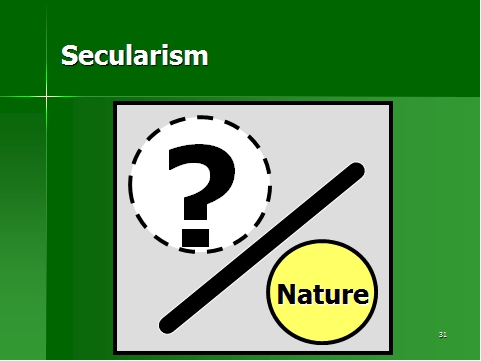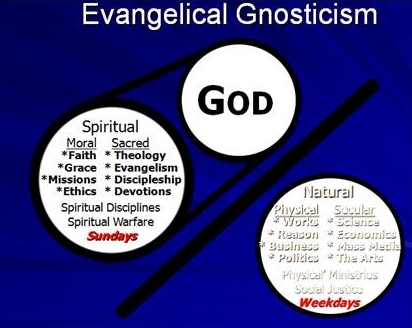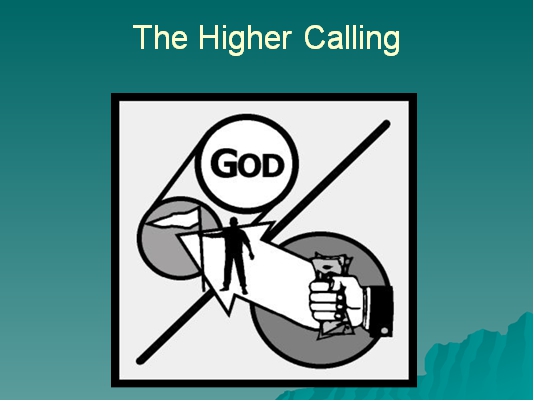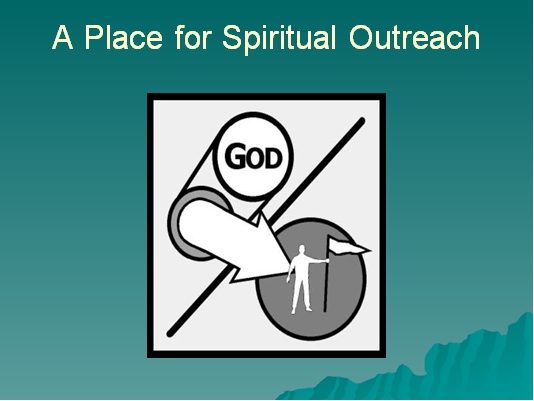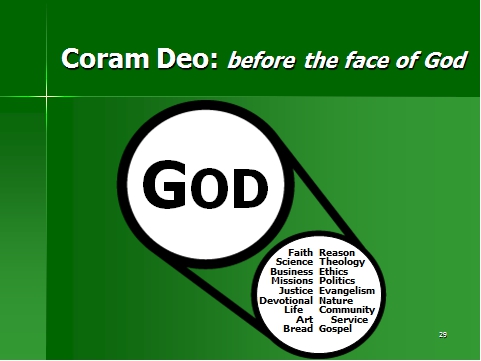Over the years, many people have asked me, What does it mean to be a Christian at work? How does a Christian to function in the market place? I always answer that it depends on your worldview.
Many Christians function in their work from an Atheist/Materialist worldview. As the graphic below indicates, the secularist does not acknowledge God. Instead of honoring God’s rule over all things (“nature”), they profess to believe that nothing gave rise to everything. No Christian would agree, but many Christians live as if this lie were true. They do not live coram Deo, before the face of the God who made them, loved them, and redeemed them. They are Christians on Sunday, but not on Monday. They function by the world’s standards of doing business.
Then there are Christians who function from a Dualistic, Sacred/Secular worldview, as pictured below. They divide reality into the spiritual and the natural. (For more on this subject see Scott Allen’s excellent book, Beyond the Sacred-Secular Divide.)
This divide has two expressions. Some Christians leave the secular workplace for the “higher calling” of spiritual work.
This happens when Christians view their “secular” job–whether business, auto mechanics, homemaking, farming, et al–as less important than “spiritual” work. So they become a missionary, evangelist, church planter, or pastor.
Within missionary circles are people who use their “secular work” to secure a passport for entry into otherwise closed countries. Once across the border, they secretly do the “more important” work of evangelism and church planting. The secular work has little or no value on its own. Its true worth is to create a platform for the more important spiritual work.
The second application of the S/S dichotomy is the Christian who continues to function in a career–whether engineer, architect, cook, or contractor–but somehow needs to justify the secular work by erecting a mental framework that holds spiritual ministry more important. So they use their secular work as a place to do spiritual ministry.
Christians like this will hold a Bible study or prayer meeting in their workplace. They will leave gospel tracts and Christian magazines in the lobby of their office or business. There’s nothing wrong with such activities, but they can reflect an unbiblical view of work. Such a philosophy does not reckon with what it means to be a Monday Christian.
Monday Christianity is not simply bringing church activities to work. A Monday Christian thinks from a Biblical worldview and addresses work from Biblical principles. A Monday Christian consciously connects the kingdom of God to his or her work. In fact, at the DNA we believe God wants to advance his kingdom through your work.
Is there spiritual work to do? Yes, of course. Author David Hansen, in his book, The Art of Pastoring: Ministry Without All the Answers, suggests that a pastor is a parable of Christ. He says this based in part on the similarities of what Jesus did and what a pastor does. Whether you agree with Hansen’s thesis or not, certainly every pastor has a calling and has work to do. Indeed, Christ has his own calling and work to do.
And so do you. You also have your own calling and work to do. In part, that means you are to do your work the way Christ would do it if he were in your vocation. You represent Christ’s interests and values at your work. You are an ambassador of the King and his Kingdom in your employment.
We’re ambassadors of the King and citizens of the kingdom. Yet we also live in a world shaped by atheistic and materialistic culture. The worship of self and material things has created a culture that is, in turn, building a civilization. Ours is no longer a virtuous culture nor a virtuous people. Os Guinness, in his book A Free People’s Suicide, puts it this way: we have leadership without character, business without ethics and science without human values – in short, freedom without virtue … He goes on to warn that these deficits will bring the republic to its knees.
Many Christians believe the church is a “fish bowl” in the larger civilization. They seem to think that the best the church can do is to create a little island (in our church buildings) of spirituality in the midst of our materialistic civilization. But to live as a Monday Christian is to bring character (not just skills) into leadership, ethics (not just the “bottom line”) into business, biblical values (which ask Ought we do it? not just Can we do it?) into science and technology.
If we do not think and function with virtue in the market place and public square, we may call ourselves “religious” or “spiritual” but we can hardly call ourselves Christian.
It’s easy to be a Christian on Sunday, and it’s relatively simple to work respectably in an ecclesiastical vocation. Functioning with virtue in the market place can be hard. It carries a price. To see what this might look like, read the appeal below from David Green, Founder and CEO of Hobby Lobby Stores. Here is a Christian and a business owner, pushing back against the increasing godlessness and lawlessness in American culture. May more and more Christians have the courage to live out a Biblical worldview, to exhibit lives of godly principle in the public square.
If you agree with David Green, please forward the link to this post to your mailing list.
– Darrow Miller
A Letter from David Green, the founder and CEO of Hobby Lobby Stores, Inc.
When my family and I started our company 40 years ago, we were working out of a garage on a $600 bank loan, assembling miniature picture frames. Our first retail store wasn’t much bigger than most people’s living rooms, but we had faith that we would succeed if we lived and worked according to God’s word. From there,Hobby Lobby has become one of the nation’s largest arts and crafts retailers, with more than 500 locations in 41 states. Our children grew up into fine business leaders, and today we run Hobby Lobby together, as a family.
We’re Christians, and we run our business on Christian principles. I’ve always said that the first two goals of our business are (1) to run our business in harmony with God’s laws, and (2) to focus on people more than money. And that’s what we’ve tried to do. We close early so our employees can see their families at night. We keep our stores closed on Sundays, one of the week’s biggest shopping days, so that our workers and their families can enjoy a day of rest.We believe that it is by God’s grace that Hobby Lobby has endured, and he has blessed us and our employees. We’ve not only added jobs in a weak economy, we’ve raised wages for the past four years in a row. Our full-time employees start at 80% above minimum wage.
But now, our government threatens to change all of that. A new government health care mandate says that our family business MUST provide what I believe are abortion-causing drugs as part of our health insurance. Being Christians, we don’t pay for drugs that might cause abortions, which means that we don’t cover emergency contraception, the morning-after pill or the week-after pill. We believe doing so might end a life after the moment of conception, something that is contrary to our most important beliefs. It goes against the Biblical principles on which we have run this company since day one. If we refuse to comply, we could face $1.3 million PER DAY in government fines.
Our government threatens to fine job creators in a bad economy. Our government threatens to fine a company that’s raised wages four years running. Our government threatens to fine a family for running its business according to its beliefs. It’s not right. I know people will say we ought to follow the rules; that it’s the same for everybody. But that’s not true. The government has exempted thousands of companies from this mandate, for reasons of convenience or cost. But it won’t exempt them for reasons of religious belief.
So, Hobby Lobby and my family are forced to make a choice. With great reluctance, we filed a lawsuit today, represented by the Becket Fund for Religious Liberty, asking a federal court to stop this mandate before it hurts our business. We don’t like to go running into court, but we no longer have a choice. We believe people are more important than the bottom line and that honoring God is more important than turning a profit.
My family has lived the American dream. We want to continue growing our company and providing great jobs for thousands of employees, but the government is going to make that much more difficult. The government is forcing us to choose between following our faith and following the law. I say that’s a choice no American and no American business should have to make.
The government cannot force you to follow laws that go against your fundamental religious belief. They have exempted thousands of companies but will not except Christian organizations including the Catholic church.
Since you will not see this covered in any of the liberal media, pass this on to all your contacts.
Sincerely,David Green, CEO and Founder of Hobby Lobby Stores

